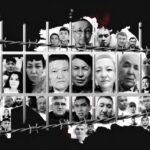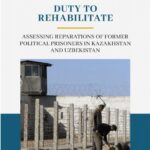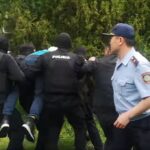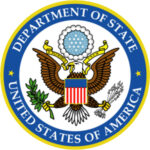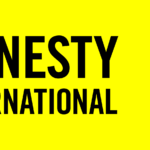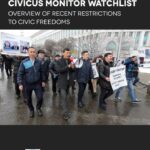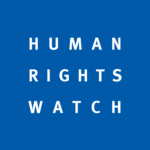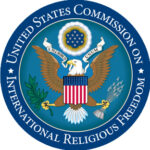Further information on UA: 129/10 Index: EUR 57/002/2011 Kazakhstan Date: 10 June 2011 Date: 10 June 2011
URGENT ACTION
ETHNIC UZBEKS AT RISK OF TORTURE IF RETURNED
Kazakhstan extradited 28 ethnic Uzbeks to Uzbekistan on 9 June , where they are at real risk of torture . Four more ethnic Uzbek men are also at risk of forcible return. The wives and children of all 32 men are also at risk of extradition .
The men originally fled Uzbekistan fearing that they would be persecuted due to their religious beliefs, practices or affiliations with banned or unregistered Islamist organizations. The Kazakhstani authorities detained the men in June 2010, at the request of the Uzbekistan government. The forcible return of 28 of the ethnic Uzbeks is a violation of Kazakhstan’s obligations under international law.
One of the men still detained and the 28 already extradited lodged appeals against the Prosecutor General’s decision to extradite them in September 2010. These were rejected by a district court in the southern city of Almaty on 15 March 2011. However, in December 2010, the Committee Against Torture imposed interim measures to stay extradition, pending a review of the merits of a complaint submitted on their behalf. The government of Kazakhstan subsequently challenged the admissibility of this complaint. In May 2011, the Committee reaffirmed the interim measures, prohibiting Kazakhstan from extraditing these individuals, pending the Committee’s decision.
Some of the female relatives of the detained men have been active in campaigning for their safety, including speaking publicly about the risks they face if forcibly returned to Uzbekistan. Such outspoken criticism of the Uzbekistani authorities is likely to put them at serious risk of prosecution, detention and torture and other ill-treatment if forcibly returned to Uzbekistan.
PLEASE WRITE IMMEDIATELY in Kazakh, Russian or your own language :
Urging the Kazakhstani authorities to respect their obligations under international law and ensure that none of the ethnic Uzbek men who remain in detention, and none of the family members of the 28 extradited men already extradited, are forcibly returned to Uzbekistan;
Reminding the authorities that forcibly returning these individuals to Uzbekistan would violate their obligations as a State party to the 1951 Refugee Convention not to forcibly return anyone to a country where they would be at risk of serious human rights violations, including torture;
Urging that they are all given full and unhindered access to international protection and that each case is determined on an individual basis, according to fair and efficient refugee status determination procedures.
Reminding Kazakhstan of its obligation under Article 3 (1) of the Convention against Torture not to expel, return or extradite a person to another State where there are substantial grounds for believing that they would be in danger of being subjected to torture and to halt extraditions in cases where CAT has issued interim measures;
PLEASE SEND APPEALS BEFORE 22 JULY 2011 TO :
President of Kazakhstan
Nursultan Nazarbaev
Presidential Administration
Levoberezhe Street
Astana 01000, KAZAKHSTAN
Fax: +7 7172 72 05 16
Salutation: Dear President
Prosecutor General
Mr Ashat Daulbayev
Prosecutor General of Kazakhstan
8, Orynbor St., House of Ministries, Entrance No.2
Astana 01000, KAZAKHSTAN
Fax: +7 7172 50 25 34
Email: procuror@nursat.kz;
Gp-rk@prokuror.kz
Sal utation: Dear Prosecutor General
And copies to:
Minister of Foreign Affairs
Kanat Saudabaev
Ministry of Foreign Affairs
35, No 1 Street, Astana 01000, KAZAKHSTAN
Fax: +7 7172 72 05 16
Email: midrk@mid.kz
Salutation: Dear Minister
Also send copies to diplomatic representatives accredited to your country. Please check with your section office if sending appeals after the above date. This is the 3rd update of UA 129/10. Further information: http://amnesty.org/en/library/info/EUR57/001/2011/en
URGENT ACTION
ETHNIC UZBEKS AT RISK OF TORTURE IF RETURNED
ADditional Information
A new law on refugees, which came into force in Kazakhstan on 1 January 2010, excluded certain categories of asylum-seekers from qualifying for refugee status in Kazakhstan. These included people charged in their country of origin with membership of
illegal, unregistered or banned political or religious parties or movements. In practice, this exclusion particularly affected
Muslims from Uzbekistan who worshipped in mosques which were not under state control or who were members or suspected
members of Islamist parties or Islamic movements banned in Uzbekistan, and who had fled the country, fearing persecution for
their religious beliefs. The newly-formed State Migration Committee, under the Ministry of Labour, began a review of all cases of
those granted refugee status by the UN refugee agency, UNHCR, before the State Migration Committee was set up. It revoked the refugee status of many people from Uzbekistan and China, most of whom were awaiting resettlement to a third country.
Despite assertions by the Uzbekistani authorities that the practice of torture has significantly decreased, reports of torture or other ill-treatment of detainees and prisoners has continued unabated. In most cases, the authorities have failed to conduct prompt, thorough and impartial investigations into these allegations.
For well over a decade, the authorities in Uzbekistan have persecuted Muslims who practice their faith outside strict state controls or who belong to unregistered religious organizations. Several thousand people convicted of involvement with Islamist parties or Islamic movements banned in Uzbekistan, as well as government critics and political opponents, continue to serve long prison terms under conditions that amount to cruel, inhuman and degrading treatment.
Human rights organizations, including Amnesty International, have documented numerous, widespread cases of torture and other ill-treatment, arbitrary detention, and deaths in custody of individuals accused of anti-state and religion-related crimes in Uzbekistan. Methods of torture and other ill-treatment have included electric shock, beatings with truncheons, rape and other sexual abuse, asphyxiation, and psychological abuse, including threats to harm a detainee’s relatives.
Uzbekistan’s record on torture and ill-treatment of pre-trial detainees and prisoners has also been documented by UN bodies, including the-then UN special rapporteur on Torture, Theo van Boven, who in 2003 found torture in Uzbekistan to be “systematic,” and the UN Committee against Torture, which after its periodic review of Uzbekistan in 2007, found that torture in places of detention in Uzbekistan is “routine” and occurs “with impunity.” In addition, the European Court of Human Rights has issued multiple rulings prohibiting states from returning persons to Uzbekistan on the basis of a risk of torture. Most recently, on 4 November 2010, in Sultanov v Russia (No. 15303/09), the Court held that “forcible return to Uzbekistan would give rise to a violation of Article 3” [of the European Convention on Human Rights and Fundamental Freedoms] as there would be a “a serious risk of being subjected to torture or inhuman and degrading treatment.”
One ethnic Uzbek asylum-seeker who was forcibly returned to Uzbekistan from Kazakhstan in September 2010 was held
incommunicado until January 2011, when a court in Uzbekistan sentenced him to 10 years in prison on a charge of belonging to a banned Islamist organization.
FU on UA: 129/10 Index: EUR 57/002/2011 Issue Date: 10 June 2011
SOURCE:
http://www.amnesty.org/en/library/asset/EUR57/002/2011/en/88652b78-fe97-4d17-bb73-10555ff95898/eur570022011en.html


